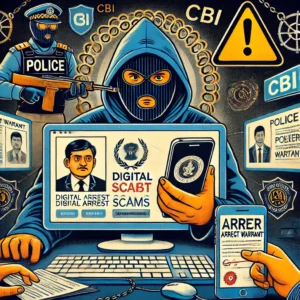Digital Arrest Fraud: How Cybercriminals in India Impersonate CBI or Police Officers & How to Protect Yourself

Digital Arrest Fraud: How Cybercriminals in India Impersonate CBI or Police Officers & How to Protect Yourself
The rise of cybercrime in India has brought forth increasingly deceptive methods to exploit unsuspecting individuals. One such alarming trend is the Digital Arrest Scam, where cybercriminals impersonate high-ranking authorities such as Central Bureau of Investigation (CBI) officers or police officers. By using fear, threats, and manipulation, these fraudsters aim to extort money or sensitive information from their victims, often leading to devastating financial and emotional consequences.
What is a Digital Arrest Scam?
In a Digital Arrest Scam, cybercriminals pose as CBI or police officers and claim that their target is involved in illegal activities such as money laundering, fraud, or terrorism. They often say an arrest warrant has been issued against the victim and pressure them to pay a fine, settle charges, or provide sensitive information to avoid being arrested.
These scams are sophisticated, as fraudsters may use fake identification, spoofed phone numbers, or forged official documents to make their claims appear legitimate. The fraudsters’ goal is to create panic and fear, forcing the victim to act quickly without verifying the authenticity of the claims.
How Cybercriminals Execute the Scam
- Impersonating Law Enforcement: The scammers impersonate officers from the CBI, local police, or other enforcement agencies. They typically make calls, send emails, or send messages on messaging platforms (like WhatsApp) pretending to be senior officers involved in a serious investigation.
- Forged Arrest Warrants: Victims are sent fake arrest warrants or legal notices on letterheads resembling those of the police or CBI. These documents may include the victim’s personal information, adding to the perceived legitimacy of the threat.
- Use of Technology: Scammers often use caller ID spoofing to make the call appear as if it is coming from a legitimate number, like that of a police station or government agency. Some even provide fake case IDs or officer badges to sound more convincing.
- Demand for Immediate Payment: The fraudster demands immediate payment—either through bank transfers, UPI, or cryptocurrency—to “settle” the charges or prevent an arrest. In some cases, they may also demand personal information like Aadhaar numbers, bank details, or passwords.
- Threats and Pressure: The scam thrives on instilling fear. Phrases like “You will be arrested in a few hours,” “Your passport will be seized,” or “You will face legal action” are commonly used to pressurize the victim into paying without questioning.
Real-Life Cases of Digital Arrest Fraud in India
Several cases have surfaced where cybercriminals posed as officers from prestigious institutions like the CBI or police departments, targeting innocent people across India. In some instances, they even threatened to publicize the victim’s alleged criminal activities unless they complied with demands.
These frauds have become so rampant that authorities have issued advisories to the public, urging vigilance when receiving such unsolicited calls or messages.
How to Protect Yourself from Digital Arrest Scams
- Stay Calm and Verify: If you receive a call or message from someone claiming to be a CBI or police officer, remain calm and do not panic. Scammers rely on your emotional reaction to exploit you. Always verify the identity of the caller by reaching out to the local police station or the relevant government department directly.
- Cross-check the Information:
- Ask for Identification: Legitimate law enforcement officers will always provide proper identification and allow you time to verify their credentials.
- Contact Authorities Directly: Do not respond to demands made over the phone or through online messages. Contact the official helpline of the agency they claim to represent or visit your nearest police station to verify the claim.
- Be Wary of Urgent Payment Requests: No genuine law enforcement agency will ask for money to be paid immediately over the phone or online to prevent an arrest. Any such request is a red flag.
- Avoid Sharing Personal Information: Never share personal or financial information such as Aadhaar numbers, bank account details, OTPs, or passwords over the phone or in response to suspicious emails/messages.
- Use Caller ID Apps: Apps like Truecaller can help identify spam or fraud calls, although these are not foolproof. Be cautious even if a caller’s ID appears to be from a legitimate source.
- Report the Incident: If you suspect that you have been targeted, report the incident to the Cyber Crime Portal of India (https://cybercrime.gov.in/) or file a complaint with your nearest police station. You can also use helplines like the National Cyber Crime Reporting Helpline (1930).
- Educate Yourself and Stay Informed: Stay updated on the latest methods that cybercriminals use. Awareness is a key defense against fraud. Share this information with friends, family, and colleagues so they can protect themselves as well.
Conclusion
The Digital Arrest Scam is a disturbing trend that preys on fear and manipulation. By impersonating respected law enforcement officers like those from the CBI or local police, cybercriminals gain the trust of their victims, only to exploit them. The best way to protect yourself is by staying calm, verifying the information, and never succumbing to pressure or threats. Always remember that legitimate authorities will follow proper legal procedures and never demand money or sensitive information over the phone or via messages. Stay vigilant, stay safe!

 Previous Post
Previous Post Next Post
Next Post